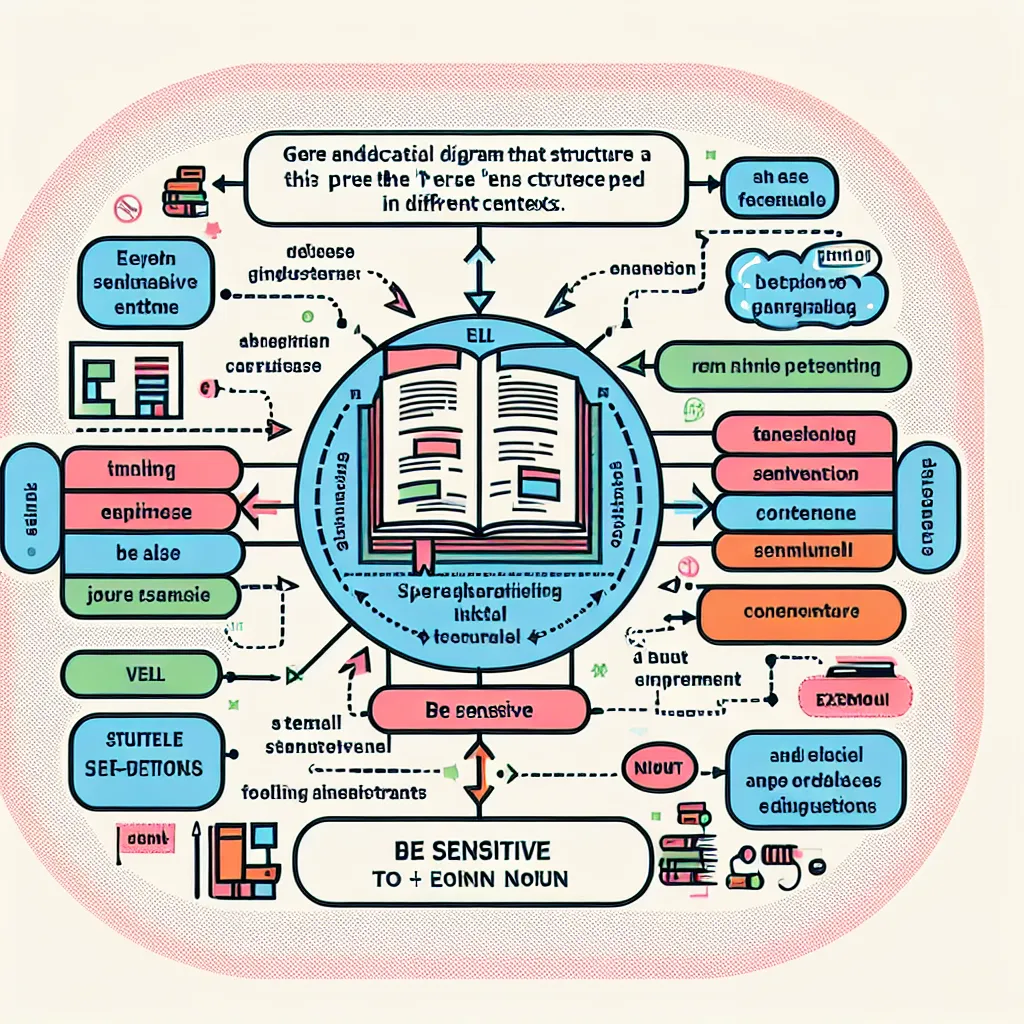In the quest for IELTS excellence, mastering sophisticated grammatical structures is crucial. One such structure that can elevate your language proficiency is “be sensitive to + noun.” This phrase is not only common in everyday English but also frequently appears in IELTS examinations, making it a valuable addition to your linguistic arsenal.
Understanding “Be Sensitive to + Noun”
The structure “be sensitive to + noun” is used to express awareness, responsiveness, or susceptibility to something. It’s a versatile phrase that can be applied in various contexts, from discussing personal feelings to analyzing complex global issues.

Grammar Formula and Usage
The basic formula for this structure is:
[Subject] + [be verb] + sensitive + to + [noun/noun phrase]
This structure is commonly used in:
- IELTS Writing Task 2 essays
- IELTS Speaking Part 3 discussions
- IELTS Reading comprehension passages
Let’s explore some examples to better understand its application:
- “Governments should be sensitive to the needs of minority groups.”
- “Modern businesses are increasingly being sensitive to environmental concerns.”
- “Artists are often sensitive to subtle changes in their surroundings.”
- “The new policy aims to make institutions more sensitive to cultural diversity.”
- “Investors need to be sensitive to market fluctuations.”
Applying “Be Sensitive to + Noun” in IELTS
IELTS Writing Task 2
In IELTS Writing Task 2, using “be sensitive to + noun” can demonstrate a high level of language proficiency and nuanced understanding of complex issues.
Example essay excerpt:
“In today’s globalized world, it is crucial for multinational corporations to be sensitive to local customs and traditions. By demonstrating cultural awareness, companies can build stronger relationships with local communities and avoid potential misunderstandings. Moreover, organizations that are sensitive to environmental concerns are more likely to gain public support and maintain sustainable operations in the long term.”
IELTS Speaking Part 3
For the Speaking test, incorporating this structure can showcase your ability to discuss abstract concepts and societal issues.
Example response:
Examiner: “How can governments better address the needs of different generations?”
Candidate: “I believe it’s essential for governments to be sensitive to the unique challenges faced by each generation. For instance, they should be sensitive to the financial pressures on young adults, such as student debt and housing costs. At the same time, they need to be sensitive to the healthcare and pension needs of older citizens. By being sensitive to these diverse requirements, governments can create more balanced and inclusive policies.”
Achieving Higher Band Scores with “Be Sensitive to + Noun”
To achieve a higher band score in IELTS, it’s not enough to simply use the structure correctly. You need to demonstrate flexibility and sophistication in its application.
Band 6 example:
“Companies should be sensitive to worker needs.”
Band 7-8 example:
“Forward-thinking organizations are increasingly being sensitive to the diverse needs of their workforce, recognizing that employee well-being directly impacts productivity and innovation.”
Band 9 example:
“In an era of rapid technological advancement, it is imperative for policymakers to be acutely sensitive to the potential socioeconomic ramifications of automation, ensuring that the transition towards a more digitalized economy does not exacerbate existing inequalities or create new ones.”
Common Mistakes and How to Avoid Them
-
Incorrect preposition:
Incorrect: “Be sensitive for climate change”
Correct: “Be sensitive to climate change” -
Using an adjective instead of a noun:
Incorrect: “Be sensitive to environmental”
Correct: “Be sensitive to environmental issues“ -
Overuse or forced use:
Avoid using the structure multiple times in close proximity or in contexts where simpler expressions would be more natural. -
Forgetting to conjugate “be”:
Incorrect: “Companies be sensitive to market trends”
Correct: “Companies are sensitive to market trends”
Conclusion
Mastering the “be sensitive to + noun” structure can significantly enhance your IELTS performance across all sections of the test. By incorporating this phrase naturally and appropriately, you demonstrate a sophisticated command of English and a nuanced understanding of complex topics. Remember to practice using this structure in various contexts, and always be mindful of the specific requirements of each IELTS task.
For further practice, consider how you might use “be sensitive to + noun” in discussions about global warming, early childhood education, or describing influential people in your life. These topics often appear in IELTS exams and provide excellent opportunities to showcase your language skills.
The Importance of Early Childhood Education in Brain Development
How Global Warming is Reshaping Ecosystems
Describe a Person Who Taught You an Important Lesson
By incorporating this structure into your IELTS preparation and being sensitive to the nuances of its usage, you’ll be well-equipped to tackle a wide range of topics with confidence and linguistic flair.